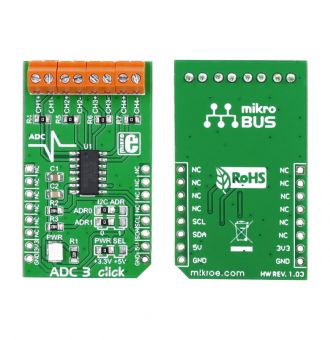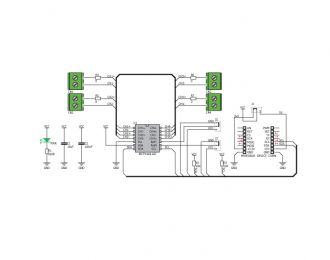
We strongly encourage users to use Package manager for sharing their code on Libstock website, because it boosts your efficiency and leaves the end user with no room for error. [more info]

Rating:
Author: MIKROE
Last Updated: 2019-03-26
Package Version: 1.0.1.1
mikroSDK Library: 1.0.0.0
Category: ADC
Downloaded: 6772 times
Followed by: 3 users
License: MIT license
ADC3 click carries Microchip’s MCP3428 16-bit multichannel analog-to-digital converter. The click has four pairs of screw terminals onboard, letting you access the chip’s four differential input channels. ADC3 click communicates with the target MCU through mikroBUS I2C pins (SCL, SDA). It is designed to use either a 3.3V or 5V power supply.
Do you want to subscribe in order to receive notifications regarding "ADC3 Click" changes.
Do you want to unsubscribe in order to stop receiving notifications regarding "ADC3 Click" changes.
Do you want to report abuse regarding "ADC3 Click".

Library Description
The library covers all the necessary functions that enables the usage of the ADC 3 click board.
It initializes and defines the I2C driver and drivers that offer a choice for reading digital
data from all four channels seperatly or all together.
Key functions:
void adc3_reset();- Function is used to initiate general call reset.Examples Description
The application is composed of three sections:
void applicationTask()
{
configuration1 = _ADC3_PGA_GAIN_X1 | _ADC3_SAMPLE_RATE_16 | _ADC3_CONTINOUS_ADDR | _ADC3_SELECT_CHANNEL_1;
readVal = adc3_readData( configuration1, _ADC3_SAMPLE_RATE_16 );
Delay_ms( 100 );
IntToStr( readVal, txtLog );
Ltrim( txtLog );
mikrobus_logWrite( "Channel 1 : ", _LOG_TEXT );
mikrobus_logWrite( txtLog, _LOG_LINE );
configuration2 = _ADC3_PGA_GAIN_X1 | _ADC3_SAMPLE_RATE_16 | _ADC3_CONTINOUS_ADDR | _ADC3_SELECT_CHANNEL_2;
readVal = adc3_readData( configuration2, _ADC3_SAMPLE_RATE_16 );
Delay_ms( 100 );
IntToStr( readVal, txtLog );
Ltrim( txtLog );
mikrobus_logWrite( "Channel 2 : ", _LOG_TEXT );
mikrobus_logWrite( txtLog, _LOG_LINE );
configuration3 = _ADC3_PGA_GAIN_X1 | _ADC3_SAMPLE_RATE_16 | _ADC3_CONTINOUS_ADDR | _ADC3_SELECT_CHANNEL_3;
readVal = adc3_readData( configuration3, _ADC3_SAMPLE_RATE_16 );
Delay_ms( 100 );
IntToStr( readVal, txtLog );
Ltrim( txtLog );
mikrobus_logWrite( "Channel 3 : ", _LOG_TEXT );
mikrobus_logWrite( txtLog, _LOG_LINE );
configuration4 = _ADC3_PGA_GAIN_X1 | _ADC3_SAMPLE_RATE_16 | _ADC3_CONTINOUS_ADDR | _ADC3_SELECT_CHANNEL_4;
readVal = adc3_readData( configuration4, _ADC3_SAMPLE_RATE_16 );
Delay_ms( 100 );
IntToStr( readVal, txtLog );
Ltrim( txtLog );
mikrobus_logWrite( "Channel 4 : ", _LOG_TEXT );
mikrobus_logWrite( txtLog, _LOG_LINE );
mikrobus_logWrite( "------------------", _LOG_LINE );
Delay_ms( 1000 );
}
Other mikroE Libraries used in the example:
Additional notes and informations
Depending on the development board you are using, you may need USB UART click, USB UART 2 click or RS232 click to connect to your PC, for development systems with no UART to USB interface available on the board. The terminal available in all MikroElektronika compilers, or any other terminal application of your choice, can be used to read the message
